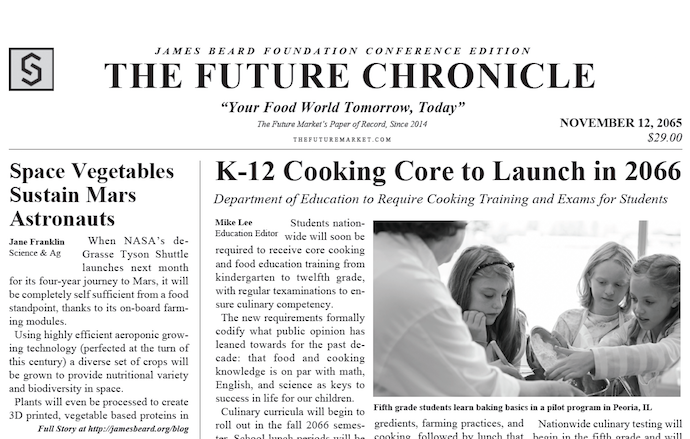The Future Chronicle, Part 4: Nobel Prize for Agriculture Winners Announced
Mike Lee
Mike LeeDecember 10, 2015

As we wrap up our coverage of the 2015 JBF Food Conference, we turn our eyes to the possibilities of tomorrow's farms, restaurants, grocery stores, and kitchens. We've partnered with the Future Market for a multi-part series exploring some of the visions of the future discussed at the conference, in the form of the Future Chronicle, a newspaper snapshot of 2065. Read the full issue here, and stay tuned for more dispatches from the mid-twenty-first century.
Nobel Prize for Agriculture Winners Announced
December 10, 2065
Mike Lee
This year’s three Nobel Agriculture Prize winners are a diverse set, but all share the distinction of being under age 30. Atikilt Melaku, a plant breeder from Ethiopia; Marco Agrioli, an aquaponic farmer from Venice; and Erica Thompson, an urban farmer from Detroit, will all receive honors next month in Stockholm, in addition to a $25 million dollar prize to support their continued efforts in agricultural innovation.
Winners were selected based on their works’ impact on creating food that’s beneficial for the planet, people, and profits. Ms. Melaku’s innovations in cross-breeding sorghum to reduce water inputs by 75% while increasing protein and vitamin content by nearly double have changed the social fabric of local communities in her home country. Her crop has enabled the country to stabilize its economy and become the world’s leading supplier of sorghum products.
Mr. Agrioli has led a highly successful campaign to harness the heavily polluted grand canals of his hometown city into highly productive farmland through aquaponics. Not only is Agrioli’s team able to supply virtually all of the city’s fruit and vegetable needs with his floating water farms, but the plants have purified the water to pristine levels not seen for millennia.
Finally, Ms. Thompson continues her family’s 50-year legacy of transforming the Detroit landscape from industrial wasteland to flourishing metropolis with agriculture as its main economic driver. Ms. Thompson is at the helm of a sprawling family organization that has been converting vacant industrial lots into farmland since the early 2000s.
The Nobel Agriculture Prize has been awarded 24 times and reflects the considerable progress innovators have made on our food supply. The large majority of laureates have been under age 30, which is indicative of agriculture’s status as an aspirational focus among modern youth.
Past laureates have gone on to lead long careers building on the work pf their formative years, which this year’s winners also hope to do. “Changes in our food ecosystem tend to move slow. But I have many decades of productivity ahead of me, and the fact that I may one day see the Venice canals clean and growing delicious food is what keeps me going each day,” said Mr. Agrioli.
Read the previous entries from the Future Chronicle here.
The Future Chronicle is the official paper of record for the Future Market. See what's on the shelves of the Future Market here.



-57 web.jpg)


